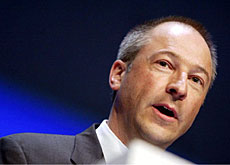Swisscom sidesteps foreign acquisition shackles

Telecommunications firm Swisscom has relaunched its overseas ambitions with a €3.7 billion (SFr5.98 billion) takeover bid for Italian broadband operator Fastweb.
The deal would represent the first major foreign acquisition since the Swiss government, Swisscom’s majority stakeholder, overruled its previous expansionist strategy more than a year ago.
Analysts say the proposed deal represents good value for money and sound strategic sense as Fastweb, Italy’s second-largest fixed network operator and a leading provider of internet protocol (IP) services, is rapidly expanding into growth areas.
Fastweb are currently mulling over the friendly takeover offer of €47 (SFr75.92) per share pending regulatory approval, the ability to buy at least 50 per cent plus one share, and other minor provisos.
Fastweb’s board welcomed the bid and urged Swisscom to make the offer as soon as possible. The company’s chairman and large shareholder Silvio Scaglia said he was ready to hand over his 18.75 per cent stake unless a better offer emerged.
Shares in the Italian broadband operator leaped over the offer price to a high of €49.06 on speculation of a counterbid.
The Italian company has impressed observers with its investment into profitable sectors such as IP technology and the rapid expansion of its customer base, despite posting losses last year.
Multi-media strategy
“Fastweb is growing fast and has a completely new IP-based infrastructure so it makes strategic sense. They are winning market share in Italy,” Helvea analyst Tomas Hilfing told swissinfo.
“They will probably be loss-making in the first couple of years, but that is because they have been investing a lot in their infrastructure.”
Bank Vontobel analyst Pangiotis Spiliopoulos agrees that the takeover would fit with Swisscom’s stated strategic goals.
“It is seen as a good move as it is in line with the strategy announced by Carsten Schloter [Swisscom chief executive] a year ago to move Swisscom from pure telecoms to a more multi-media based company,” he told swissinfo.
“The only way you can compensate for a decline in fixed-line revenues is to gain exposure in growing markets. In terms of size this is a big step forwards and it makes sense.”
The government ban on Swisscom buying foreign companies that came with statutory service commitments scuppered the proposed takeovers of Ireland’s Eircom and Telekom Austria in November 2005 and led to the resignation of chief executive Jens Alder two months later.
Small scale takeovers
Swisscom responded to the perceived political interference by using its vast cash reserves to buy back a SFr4.25-billion ($3.47 billion) stake in its mobile telephone unit from British group Vodafone.
It also made some small-scale collaborations and acquisitions abroad, such as Antenna Hungaria in Hungary.
But the Fastweb takeover looks a much better acquisition than previous targets, according to Thomas Hilfing.
“If you look at the companies they were trying to buy before, most of them had service obligations, were not growing that fast and had old infrastructure. This looks to be a better deal than Eircom,” he said.
Fastweb is reported to be part of an Italian investigation into irregular tax claims, but Hilfing does not think this will affect the proposed deal.
“They have already conducted in-depth due diligence that means that Fastweb has probably let them look into all issues, and they know what they are doing,” Hilfing added.
swissinfo, Matthew Allen
Fastweb was founded in 1999 as an alternative broadband provider for the city of Milan.
The company was the world’s first provider of integrated voice, data and video services based on internet protocol.
Fastweb 2006 results:
Consolidated net loss: -€123.6 million (-SFr199.91 million) compared with €124.8 million in 2005.
EBIT: -€87.5 million compared with -€107.4 million in 2005.
Broadband subscribers: 1,062,400 (+49%).
Swisscom 2006 results to be announced on Tuesday.
In November 2005, Swisscom’s plans to buy overseas targets such as Irish telecoms operator Eircom was overturned by the Swiss government as being too risky. Swisscom was hit with an acquisition ban on foreign companies that were tied down with statutory service commitments.
At the same time the government announced its intention to sell its 66.1% stake in Swisscom.
In January 2006, chief executive Jens Alder resigned, saying his position was untenable after the government vetoed his strategy. He was succeeded by Swisscom Mobile boss Carsten Schloter.
In June of last year, the Senate finally rejected proposals from the Swiss cabinet and the Swisscom board to privatise the company. The House of Representatives had already voted against the idea the previous month.

In compliance with the JTI standards
More: SWI swissinfo.ch certified by the Journalism Trust Initiative











You can find an overview of ongoing debates with our journalists here . Please join us!
If you want to start a conversation about a topic raised in this article or want to report factual errors, email us at english@swissinfo.ch.